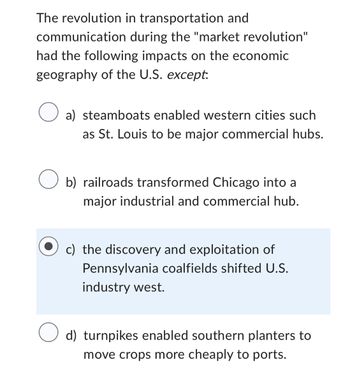Question

Transcribed Image Text:### The Market Revolution and Its Impacts on U.S. Economic Geography
During the "market revolution," significant advancements in transportation and communication led to transformative impacts on the economic geography of the United States. Below is an analysis of how different innovations influenced the landscape, with one exception:
1. **Steamboats**: These enabled western cities, such as St. Louis, to grow into major commercial hubs by facilitating the movement of goods and people along rivers.
2. **Railroads**: This innovation transformed cities like Chicago into major industrial and commercial centers, as they provided efficient transportation of goods across long distances.
3. **Pennsylvania Coalfields**: Contrary to the other points, the discovery and exploitation of coal in Pennsylvania did not shift U.S. industry westward, indicating an exception in the pattern of geographic change.
4. **Turnpikes**: These roads allowed southern planters to transport crops more affordably and efficiently to ports, enhancing agricultural commerce in the South.
This explanation highlights the profound influence of transportation advancements, excluding the factor of Western industrial shifts due to Pennsylvania's coalfields.
Expert Solution
This question has been solved!
Explore an expertly crafted, step-by-step solution for a thorough understanding of key concepts.
This is a popular solution
Trending nowThis is a popular solution!
Step by stepSolved in 4 steps
